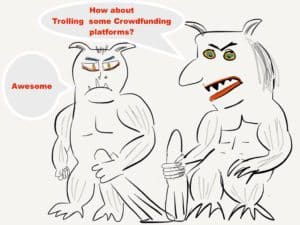Two Year Patent Troll Case Ends in Triumph as Gust Refuses to Settle in “Giant Win” for Crowdfunding Industry.
Gust, the “world’s largest community of entrepreneurs and early-stage investors”, has won a huge victory in court that impacts the entire crowdfunding industry. Today Gust announced the end of a two-year court case originally brought against it by the patent assertion entity AlphaCap Ventures. Crowdfund Insider covered the case originally in early 2015 when it was discovered that AlphaCap Ventures had filed a patent infringement lawsuit against 10 different crowdfunding platforms. We posited at the time that AlphaCap may have tried to pick a fight outside its weight class. Gust has  now claimed victory as US District Judge Denise Cote found the case “exceptional” under 35 U.S.C. § 285, described as a rarity in patent cases, and awarded Gust over $500,000 in attorneys’ fees and costs, against both the plaintiff and the plaintiff’s counsel, Gutride Safier LLP.
now claimed victory as US District Judge Denise Cote found the case “exceptional” under 35 U.S.C. § 285, described as a rarity in patent cases, and awarded Gust over $500,000 in attorneys’ fees and costs, against both the plaintiff and the plaintiff’s counsel, Gutride Safier LLP.
The patent lawsuit filed by AlphaCap claimed ownership over “online equity financing”. As with most other patent lawsuits, the case was brought in the Eastern District of Texas. This court is known as a patent troll haven and has benefitted economically from an assumed bias in favor of trolls.
Nine of the defendants, including some of the biggest names in crowdfunding like Indiegogo, AngelList, GoFundMe, RealtyMogul and more, decided to settle and skip a prolonged legal battle. Gust decided to go to war. David Rose, Gust founder and CEO, vowed to fight the case all the way to the Supreme Court if necessary.
 Speaking with Crowdfund Insider, Rose explained his motivation to confront the AlphaCap patent troll and stand up for the emergent industry;
Speaking with Crowdfund Insider, Rose explained his motivation to confront the AlphaCap patent troll and stand up for the emergent industry;
“We decided to fight the case the minute we were served. For a host of reasons it was obviously a completely bogus case from the very beginning, and it was apparent—to us AND to the troll, as they later admitted and the judge confirmed—that they would have no chance whatsoever of winning if it went to trial. So my first attempt was to rally the other defendants, get everyone to throw in a few dollars, and take a united stand at beating down the troll. But because there is always at least a tiny chance that you could lose in court, and because litigation can be frightfully expensive whether you lose or win, the others decided—from their perspective, probably quite rationally—to optimize their short-term economics and pay tens of thousands of dollars to make the ‘nuisance suit’ go away.”
“Unfortunately for the troll, however, I’m just not built that way. Since we felt certain that as long as we were willing to keep fighting, we would ultimately win, from Day One we put a standing offer on the table to the troll: pay our legal fees, give us the patents, and go home. This drove their attorneys absolutely crazy, to the point that they were screaming at our lawyers “it’s not supposed to work that way!” So they continued to attack, assuming that as the costs mounted we would eventually give in. But I’m a strong believer in principles, and one of them is “millions for defense, but not one cent for tribute”. Besides, I felt that Gust, as the oldest, largest and most comprehensive online platform, had an implicit obligation to stand up for the industry that we had helped create: for those who hadn’t yet been sued, for anyone who would want to enter the online funding industry in the future, and even for those who had chosen to settle rather than fight.”
Rose said the case was extraordinary as the judge called the case “exceptional” as both AlphaCap and their lawyers knew from the beginning the infringement lawsuit was frivolous.
“As a result, not only were we granted our legal fees plus interest (which is unusual), but the judgement was entered against both AlphaCap AND its lawyers (which is truly ‘exceptional’),” stated Rose. “The result is to put the patent trolling industry, and the lawyers who support them, on clear notice that they had better be careful when plying their trade, because they might just run into another defendant willing to stand up and fight, and that fight might be very, very costly…to the troll.”
 Gust’s long time outside counsel Lori S. Smith and Frank Bruno of White and Williams succeeded in having the case transferred to the appropriate venue of the Southern District of New York. This was an important early victory for Gust. The legal team incorporated a strategy designed to not only win this case but to discourage future non-practicing entities, particularly those holding clearly invalid patents, from bringing similar abusive litigation in the future.
Gust’s long time outside counsel Lori S. Smith and Frank Bruno of White and Williams succeeded in having the case transferred to the appropriate venue of the Southern District of New York. This was an important early victory for Gust. The legal team incorporated a strategy designed to not only win this case but to discourage future non-practicing entities, particularly those holding clearly invalid patents, from bringing similar abusive litigation in the future.
In 2014, the Supreme Court found in Alice Corp. LLC v. CLS Bank International that taking an otherwise unpatentable idea and adding the concept of “doing it on a computer” did not make it a patent-eligible invention. Judge Cote found in her ruling that AlphaCap sued Gust seven months after the Alice ruling with full knowledge that the case was frivolous and, if ever taken to trial, was not winnable.
Smith said they were understandably pleased with the judge’s decision that sided with their client but also sends a clear message to patent trolls everywhere. Bruno added that patents are necessary to protect the work of truly novel inventions but in this case – a patent should have never been issued because it was abstract in nature and sought to abuse the system.
 The United for Patent Reform coalition described the triumph over AlphaCap a rare win and even rarer recovery of attorney’s fees against a serial patent troll.
The United for Patent Reform coalition described the triumph over AlphaCap a rare win and even rarer recovery of attorney’s fees against a serial patent troll.
“Most small firms don’t have the resources to stand up like the Gust team chose to do, when patent trolls show up with extortionate demands for money,” said Beth Provenzano, vice president of government relations and political affairs at the National Retail Federation and co-chair of the United for Patent Reform coalition. “Instead of creating new jobs and investing in new technologies, businesses large and small across many industries—from national realty, construction, and technology companies to Main Street retail shops, hotels, grocers, convenience stores, and restaurants—continue to be forced to divert resources to fighting frivolous lawsuits and overly broad claims made by patent trolls.”
 Asked what the Gust victory means for the entire crowdfunding industry, Rose stated;
Asked what the Gust victory means for the entire crowdfunding industry, Rose stated;
“This is a giant win for the crowdfunding industry in general. Because the other nine defendants had all settled, implicitly acknowledging the “validity” of the patents, if we had settled as well it would have meant that the troll would have had an unlimited hunting license to go after every current and future online funding platform. Now, with this resounding victory, no one else in the industry ever needs to live in fear that they, too, will be sued over these patents.”


